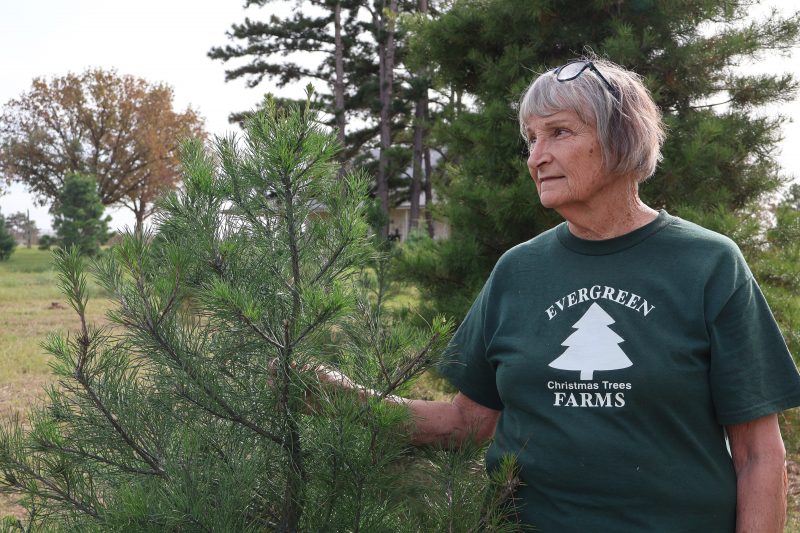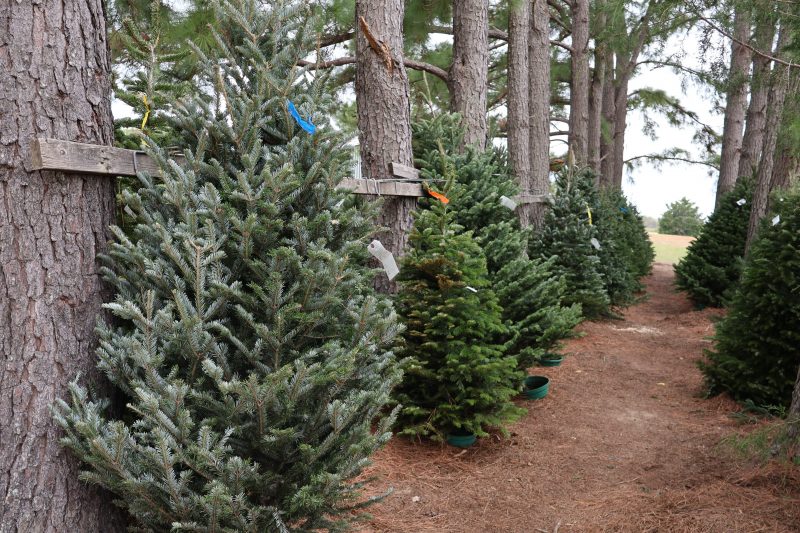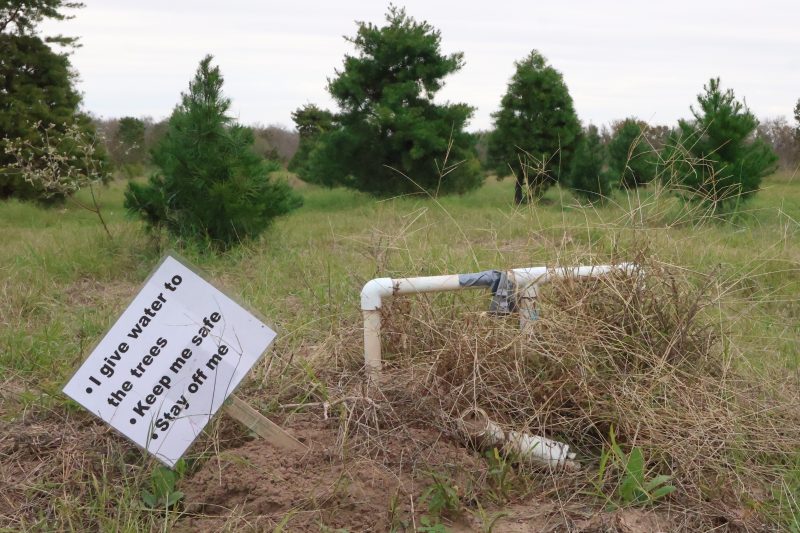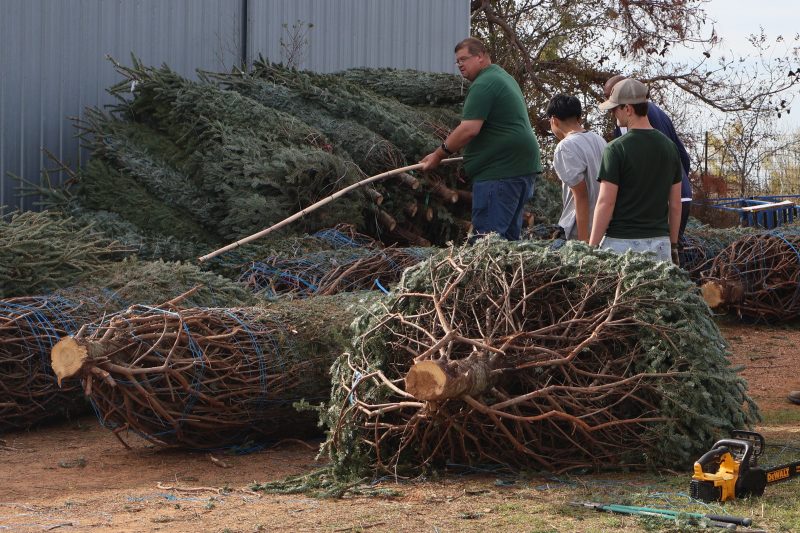Texas Christmas Tree Farmers Persevere Through Droughts to Keep Holiday Spirit Untruncated
By Isabella McGovern
Reporting Texas
Far in the countryside of Elgin, away from the congested city of Austin, is Evergreen Christmas Tree Farm, a 40-acre farm where families can choose or cut down their own Christmas tree. Large and small rows of Virginia pine trees cover the land Beth and Mike Walterscheidt call home.

Beth Walterscheidt poses with one of her Virginia pines at Evergreen Christmas Tree Farm in Elgin, Texas on Dec. 2, 2023. Large and small Virginia pine trees cover both sides of the land Beth and Mike Walterscheidt call home. (Isabella McGovern, Reporting Texas)
This family-friendly farm has been growing and selling trees for 30 years, but it hasn’t always been easy.
“What was grueling was the summer,” Beth Walterscheidt said. “It was so hot, and that was really hard for us and hard on our trees.”
After heavy demand early in the 2023 holiday season, Evergreen Christmas Tree Farm shut down its choose-and-cut fields Dec. 2 to ensure it had enough trees left to grow and sell for next year. The farm is still open and offers pre-cut trees from Washington and North Carolina.

Noble and Fraser firs lined up on display for families to browse and choose at Evergreen Christmas Tree Farm in Elgin, Texas on Nov. 29, 2023. The farm has a large selection of pre-cut firs imported from Washington state and North Carolina. (Isabella McGovern, Reporting Texas)
“The Central Texas population growth has really put a dent in our ability to have choose-and-cut trees available for everyone, so that’s why we sell out choose-and-cut trees in the first weekend and that’s what happened this year,” Walterscheidt said.
This summer, Austin recorded its hottest summer on record with an average temperature of 88.7 degrees. The city experienced 45 consecutive days of 100-degree temperatures ending in late August. This extreme weather put 40% of Texas into a severe drought. Austin received only 1.31 inches of rain for the entire summer.
Since 1990, Evergreen Christmas Tree Farm has had an irrigation system that waters five of its Virginia pine fields. The water comes from a well at the lower end of the fields, and Walterscheidt said that each field gets 24 hours of water at a time.

The farm’s irrigation system in one of the five Virginia pine fields at Evergreen Christmas Tree Farm in Elgin, Texas on Nov. 29, 2023. The water comes from a well at the lower end of the fields, and each field gets 24 hours of water at a time. (Isabella McGovern, Reporting Texas)
Walterscheidt has noticed a difference in growth over the years, especially due to the drought this year, but she said that watering the Christmas trees is the best way to help them combat the heat.
“Trees are living things and they adapt just like we adapt to the heat,” Walterscheidt said. “As long as we keep them watered (like) we keep ourselves watered, (they) will survive.”
Stan Reed, executive secretary for the Texas Christmas Tree Growers Association, said that like any crop grown in the United States, a farmer always has to be wary about the weather. His organization educates and helps farmers who are interested in growing Christmas trees in Texas.
“Most people don’t associate Texas with Christmas tree growing,” Reed said. “(Farmers) have been growing Christmas trees here since the 70’s.”
Reed said summertime is usually when tree growth can take a turn for the worse.
Due to climate change, droughts are increasing, forcing Christmas tree farmers to find solutions to protect their lots in time for the holiday season.
John Nielsen-Gammon, an atmospheric sciences professor at Texas A&M University and the Texas state climatologist, said that Austin’s climate is relatively dry, with Travis County experiencing drought since 2022. The drought peaked this past September, and Nielsen-Gammon said that they have seen some improvement but there is still extreme drought in the entire area.
“The most direct effect of drought for plants and agriculture is reduced moisture,” Nielsen-Gammon said. “Roots draw moisture out of the ground and when the amount of moisture in the soil is too dry, they really can’t do their job anymore.”
This can cause plants to either go dormant or die. Even if plants receive rainfall, the high temperatures will dry up the moisture faster than normal.
“We started having agricultural ecological impacts sooner than we might have been with normal temperatures,” Nielsen-Gammon said.
Nielsen-Gammon also said that it depends on the type of tree if they can survive droughts.
“Some trees are evolved to be able to survive several months of dry conditions (while) others aren’t.”.
The general expectation for future droughts is that the average amount of moisture in the soil will decrease. With higher temperatures, the evaporation rate is greater, and with rainfall coming in more intense, shorter periods as the climate gets warmer, the soil will dry out more rapidly.
“Both of those factors, being that you got drier soil than average when the drought starts, the plants run out of water sooner,” Nielsen-Gammon said.
Nielsen-Gammon said these are factors due to climate change, but that isn’t stopping farmers from growing Christmas trees.
One way, Reed said, is for farmers to order extra tree seedlings. Reed said that when farmers would plant new trees in January and February, they would also plant seedlings in pots. The seedlings planted in pots are grown to replace pines that died in the field. Finally, increasing their water is the second way to keep up Christmas trees in a drought.
“As long as you keep the trees irrigated, they don’t utilize a lot of water, but they do in a drought,” Reed said. “(Farmers) have been doing a lot more irrigation than they normally would during the drought.”
Reed said that a common misconception about most Christmas trees, like the Virginia pine, is that they can’t grow or handle hot weather. It turns out that high temperatures do not affect the trees; they are adaptive to the heat. Four kinds of Christmas trees are grown in Texas due to being climate-friendly and don’t require much water: Virginia pine, Afghan pine, Leyland cypress and Blue Ice, a type of Arizona cypress tree.
But Texas generally can’t grow fir and balsam trees. These trees are imported from other states such as North Carolina and Washington state. Firs are very popular because they look like traditional Christmas trees, so demand for them is usually high this time of year. They are usually pre-cut and on display for families to choose which to take home.

Christmas tree farm workers organize pre-cut Noble and Fraser firs at Evergreen Christmas Tree Farm in Elgin, Texas on Dec. 2, 2023. Fir trees are very popular because they look like traditional Christmas trees, so demand for them is usually high during the holidays. (Isabella McGovern, Reporting Texas)
Walterscheidt has noticed that people are buying their Christmas trees early this year, perhaps due to Thanksgiving falling on an early date.
Evergreen Christmas Tree Farm expects to see high numbers in attendance this holiday. Usually, the farm is busy on the weekends. Walterscheidt also expects to have an increase in sales; they estimate to sell over a thousand Christmas trees this year.